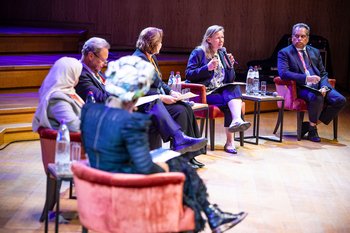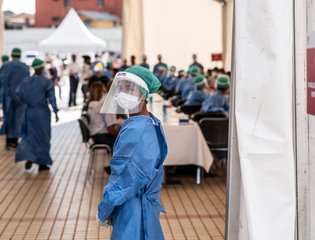
Speaking on a panel at the European Humanitarian Forum in Brussels, ALNAP director Juliet Parker reflected on what is needed to make the humanitarian sector future proof.
I don’t think it’s possible to have a system that’s future proof, but we can definitely move towards one that’s future ready.
Some people say the humanitarian system is broken. But the humanitarian system is working. It’s delivering an unbelievable amount of humanitarian assistance in extremely difficult circumstances and getting incrementally better at doing it. On some sector-specific technical learning, the trajectories are beautiful - we’re getting better at nutrition interventions, we’re getting better at cash interventions. But our ability to learn and change the complex issues that actually challenge the fundamental business model of the humanitarian system - accountability to affected populations and localisation, for example - is stuck.
Future predictions are for the complexity, scale and frequency of crises to increase, but the system isn’t nimble enough to change and adapt in ways that ensure we’re better able to respond.
The humanitarian sector is rich in knowledge, experience and learning. Often, we find the answers already exist within the system. We know what needs to happen, but the reality of translating learning into change, our ability to manage the relationships, spaces and opportunities to create that change, is challenging. The system is frustrating itself with the number of cultural, procedural and sectoral hurdles we have put in place that we can’t get beyond.
ALNAP looks at reform initiatives and change opportunities and finds the sector is wasting precious time and money by reinventing the wheel and not taking full advantage of learning that already exists.
There’s something about the mentality in the sector: we all like to think we’re the first and only organisation creating change. This mentality is part of the problem, compromising our ability to create the relationships and explore the partnerships that would enable us to unlock the full potential of learning and experience within the sector. This is true at a sector level, but also in the operational day-to-day realities.
I recently had conversations with three country directors, who all said they don’t share their best learning with other organisations - it’s too useful for them for positioning in a competitive funding environment. They also don’t particularly like to adopt tools, guidance and learning produced by other organisations, because it’s much better for them to produce their own and put their stamp on it, so they have something to ‘sell’. That mentality exists throughout the sector and is a massive inhibitor of our collective ability to adapt and change in any meaningful and responsive way.
Talking to humanitarians recently about how to strengthen learning in new and emerging crises, none of them said they needed more evidence. They all said they needed more safe learning spaces, to exchange and share, absorb and utilise what is already known.
We need those spaces to be able to think, particularly those involved in operational delivery where the most valuable learning and experience sits. They are the ones currently with the least space to sit back and question what we’re doing, how we’re doing it and why we’re doing it. Unless we create, resource and enable those spaces, the system will just keep on doing what it’s doing but a little bit better, rather than creating the level of adaptation required for a system of the future.
Which brings me to the issue of leadership. A more adaptable system needs to actually be willing to adapt. But the incentive to change won’t come from the dominant actors within that: that’s not how systems thinking works. The impetus for change will come by increasing and diversifying the number of exchanges and learning opportunities and spaces across the system, by which we can bring in a greater diversity of voices better able to challenge and provoke the kind of adaptation that a system of the future is going to need.
We need to get out of our bubbles, both within the system and in our relationships with those outside the system. We will always tend to engage more with people who are like us, have the same background, share the same vision, speak the same language. But the humanitarian system needs to more actively cultivate and resource the spaces that push us beyond those comfort areas.
That takes time: to develop a common language around critical concepts with people outside the system. But unless we’re able to do that, we won’t be able to cultivate the range of perspectives we need to stimulate change. We will be stuck with a slow system that is struggling to adapt and change in a way we know it will need to do to be fit for the future.
